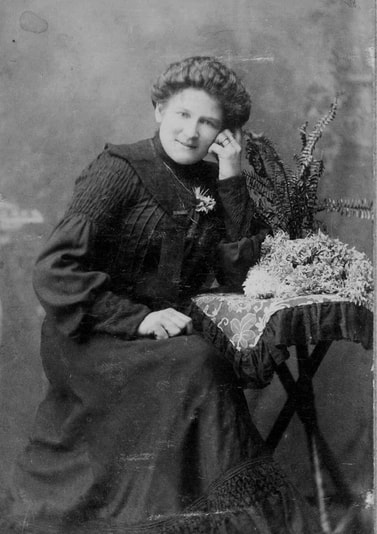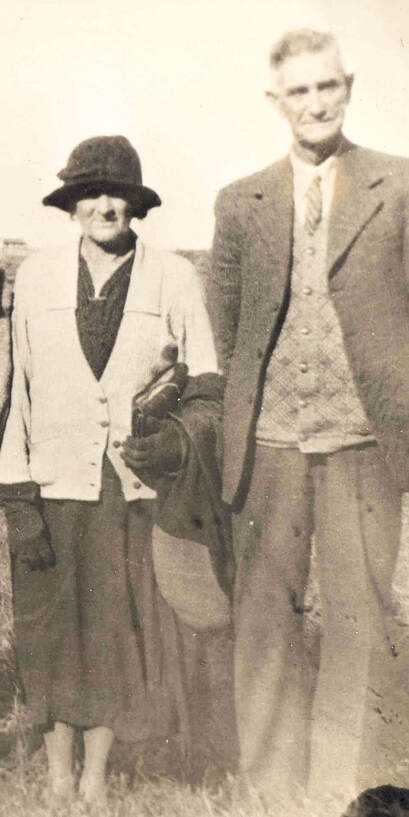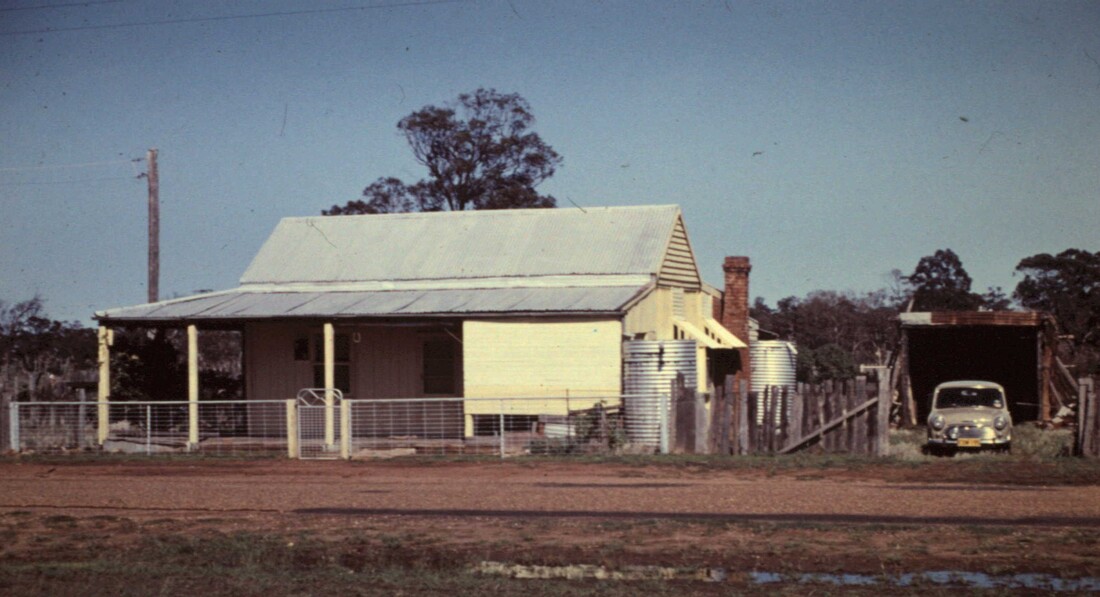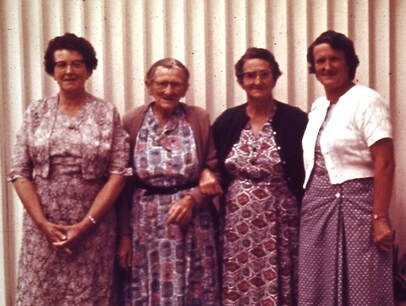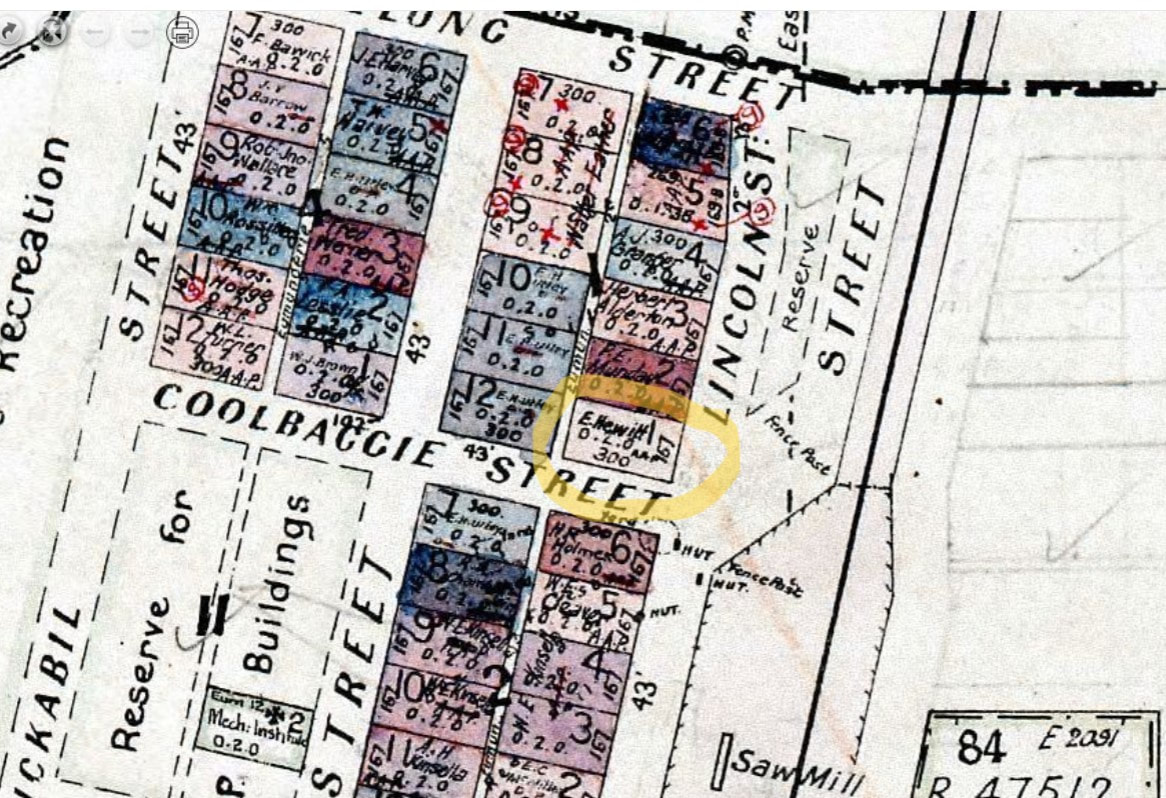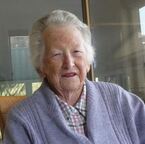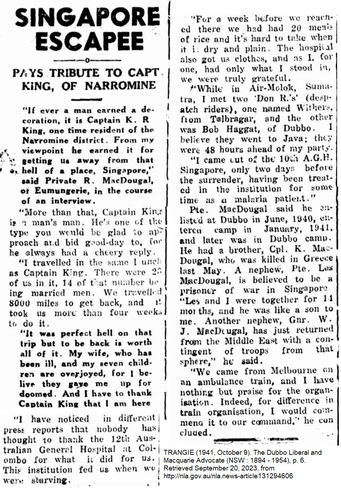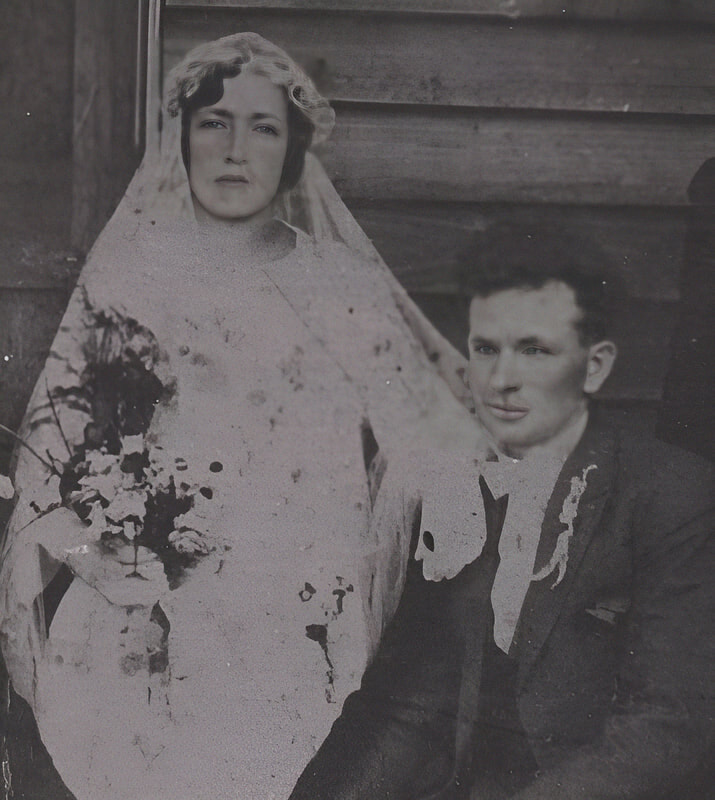Our Early Folk
William Barwick 1838-1922 & Alice May Bell Hewett, nee Ewers, 1882-1973
Alice Ewers was born on 9 November 1882 at Murrumbidgerie, just west of Geurie. She was the fourth of five children born to Jonathan Ewers and Jane Butt. Jonathan worked as a timber hauler around the Dubbo area, after stints in the Illawarra, Albury (where he married Jane) and Young. Both the Ewers and Butt were ‘old’ Australian families, arriving in the first 40 years of English settlement.
Alice spoke little of her upbringing, though she recalled the fears of local residents of the period when the Governor Boys (as she called them) ranged the area as bushrangers. She recalled being told to ‘lock the doors’ at night – something that was never done in her part of the country in those days.
Alice secured an early connection with Eumungerie. When she was just nine in 1891, her elder sister Edith married George Barwick from one of Eumungerie’s first families. This established the first of several connections between the Ewers and Barwick families, and of course, Eumungerie.
Sometime at the turn of the 20th century, Alice met a tall railway contractor called Edward (Ted) Albert Hewett. Ted came from a railway family in Richmond (NSW), but subsequently was transferred to Eumungerie. Alice and Ted were married in Dubbo on 19 October 1904.
Alice spoke little of her upbringing, though she recalled the fears of local residents of the period when the Governor Boys (as she called them) ranged the area as bushrangers. She recalled being told to ‘lock the doors’ at night – something that was never done in her part of the country in those days.
Alice secured an early connection with Eumungerie. When she was just nine in 1891, her elder sister Edith married George Barwick from one of Eumungerie’s first families. This established the first of several connections between the Ewers and Barwick families, and of course, Eumungerie.
Sometime at the turn of the 20th century, Alice met a tall railway contractor called Edward (Ted) Albert Hewett. Ted came from a railway family in Richmond (NSW), but subsequently was transferred to Eumungerie. Alice and Ted were married in Dubbo on 19 October 1904.
Ted’s work as a fettler on the new Coonamble branch line was steady, especially as the line was in a period of growth. The family started like many in those days, living on railway property in a makeshift cabin. Life in Eumungerie must have agreed with Alice and Ted, for he never sought a transfer away in over 35 years of work there as a fettler.
Shortly after their marriage, Alice and Ted were able to purchase a block of land on the corner of Railway and (Coalbaggie) Emu Streets. Ted then built a home of vertical ironbark planks, which stood well into the 1980s. The house never had electricity, internal plumbing and relied on tank water. All cooking was done on a small combustion stove which was always alight. Although just two bedrooms, family celebrations at Christmas and Easter would see more than 20 people take up residence!
The marriage was productive; within nine years they had four girls – Doris, Beulah, Zillah and Alice (junior). Life involved a cycle of social activities surrounding village dances and fund-raising once the Great War commenced. Numerous newspaper articles available on the National Library’s Trove website tell the story of Alice, on organising committees, baking cakes and generally helping out.
The 1920s started with the birth of Douglas, Alice’s fifth child and only son. He was much doted upon by his mother and four elder sisters. During this decade, Alice’s daughters Doris and Zillah both married and left for Melbourne. Daughter Beulah married William McMillan and moved up town to their property at the north end of the railway yard. Later the youngest, Alice junior, married the eldest son of Eumungerie’s station master, Arthur Jones, and moved to Wollongong. Annual holidays were taken, thanks to a free rail travel for railway employees, in Victoria, Sydney and Wollongong. Good fortune occurred in 1936 when the entire Eumungerie fettling gang of three, including Ted, won 100 pounds in the State Lottery.
Shortly after their marriage, Alice and Ted were able to purchase a block of land on the corner of Railway and (Coalbaggie) Emu Streets. Ted then built a home of vertical ironbark planks, which stood well into the 1980s. The house never had electricity, internal plumbing and relied on tank water. All cooking was done on a small combustion stove which was always alight. Although just two bedrooms, family celebrations at Christmas and Easter would see more than 20 people take up residence!
The marriage was productive; within nine years they had four girls – Doris, Beulah, Zillah and Alice (junior). Life involved a cycle of social activities surrounding village dances and fund-raising once the Great War commenced. Numerous newspaper articles available on the National Library’s Trove website tell the story of Alice, on organising committees, baking cakes and generally helping out.
The 1920s started with the birth of Douglas, Alice’s fifth child and only son. He was much doted upon by his mother and four elder sisters. During this decade, Alice’s daughters Doris and Zillah both married and left for Melbourne. Daughter Beulah married William McMillan and moved up town to their property at the north end of the railway yard. Later the youngest, Alice junior, married the eldest son of Eumungerie’s station master, Arthur Jones, and moved to Wollongong. Annual holidays were taken, thanks to a free rail travel for railway employees, in Victoria, Sydney and Wollongong. Good fortune occurred in 1936 when the entire Eumungerie fettling gang of three, including Ted, won 100 pounds in the State Lottery.
Alice’s later life was defined by the Second World War. Her only son Douglas, a promising cricketer, enlisted in the Australian Infantry Force in March 1941. He was taken prisoner of war by the Japanese in early 1942 and unbeknownst to his parents, succumbed to malnutrition in early 1944. Alice and Ted were only informed of his death in September 1945, after cessation of hostilities.
Already heavily involved in the Country Women’s Association and the Red Cross, Alice gave lifelong service to those organisations after the war. Every Saturday morning started around 4:30am, when she baked a suitcase full of scones for sale at Red Cross stalls at tennis, the races or whatever event planned for that day. This practice left the little home full of the most delicious cooking adour.
Already heavily involved in the Country Women’s Association and the Red Cross, Alice gave lifelong service to those organisations after the war. Every Saturday morning started around 4:30am, when she baked a suitcase full of scones for sale at Red Cross stalls at tennis, the races or whatever event planned for that day. This practice left the little home full of the most delicious cooking adour.
Five months before celebrating their fiftieth year of marriage, Ted passed away. He was 80 and had been retired for 15 years. His passing showed the value of Eumungerie’s strong community spirit. Family and friends gave her great support so she could remain living in her own home. She still insisted on chopping most of her own firewood, and killing whatever snakes had the misfortune of straying onto the property.
Alice’s commitment to the Red Cross remained unwavering to the end. After being presented with a foot stool for 25 years of service, she remarked that she wasn’t planning on putting her feet up any time soon.
In late 1972, Alice celebrated her 90th birthday. Age was catching up, and her diminutive stature decreased further. In March 1973, she passed away in Dubbo Hospital after a short illness. Nearly 50 years later, Alice is still remembered fondly as the old lady who was generous with her hospitality and who loved life in Eumungerie deeply.
Don Jones (a great grandson)
2022
Eumungerie Rail
Alice’s commitment to the Red Cross remained unwavering to the end. After being presented with a foot stool for 25 years of service, she remarked that she wasn’t planning on putting her feet up any time soon.
In late 1972, Alice celebrated her 90th birthday. Age was catching up, and her diminutive stature decreased further. In March 1973, she passed away in Dubbo Hospital after a short illness. Nearly 50 years later, Alice is still remembered fondly as the old lady who was generous with her hospitality and who loved life in Eumungerie deeply.
Don Jones (a great grandson)
2022
Eumungerie Rail
The Story of Harry Brookfield
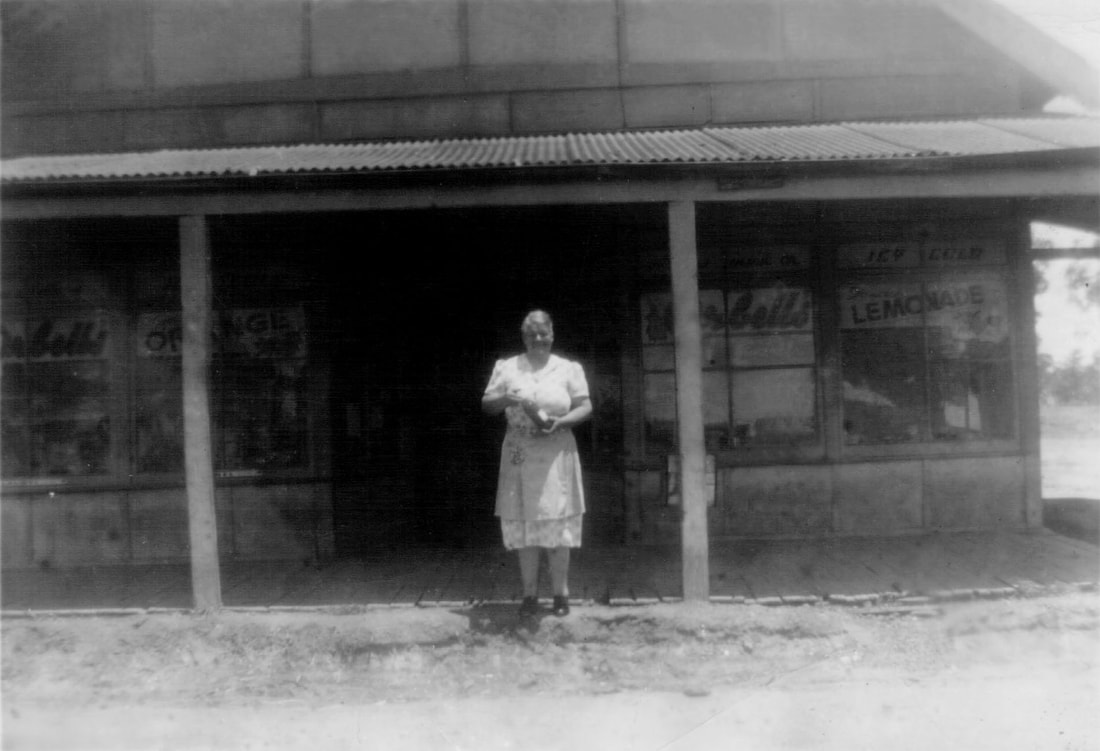 Pearl Brookfield Turner in front of the old Wheaton's Store, Eumungerie, corner Emu and Railway
Pearl Brookfield Turner in front of the old Wheaton's Store, Eumungerie, corner Emu and Railway
As recalled by Les Brookfield
As I understand from stories, recollections and facts I have gathered & experienced.
Dad’s mother was Sophia Drummond. Dad’s sister Alice (1889) was christened Drummond. Jean (1890), Henry (known as Harry, 1891, Clarence (1894), Alex (1896) and Joseph (1898) were all christened Brookfield. There is no knowledge of any marriage certificate of Sophia Drummond to Henry Brookfield and no death certificate of Henry Brookfield in any records that have been searched.
From my recollection Henry Brookfield (snr) was an itinerant worker, doing all sorts of manual labour.
He also chased after gold, silver and other minerals and as I gather was away from home lots of the time working and chasing minerals.
Grandmother Brookfield (Sophia) married Norman Kallil Solah in 1903. Norman Solah was Syrian. Sophia & Norman Solah had 4 boys — Norman (1901) christened Brookfield, George (1903), Frank (1903) and John (known as Jack)(1906) — the last three christened Solah. Norman Solah (Snr) as I believed was a drover and did laboring jobs and rabbiting and was also away from home a lot of the time.
Harry (dad) only went to school for two days and said he didn’t like it and at age 9 or 10 went droving I believe with this step father — Norman Solah. He was a casual laborer in his young days doing all sorts of laboring jobs. From his stories as I recall he was a wheat lumper, stooking bagged wheat at rail sidings around the Wylong, Temora, Barmedman & other places in the Wylong - Aria Park districts. He also did clearing, fencing and trapped rabbits over the central west. In 1914 he was working in the Eumungerie district, fencing and clearing and he told me he did some clearing and fencing on ‘Balgowan’ Eumungerie and on ’Bundemar’ Trangie.
In 1914 he tried to enlist in the army at Dubbo but was not accepted because he had flat feet and his little finger on his right hand was doubled back in a closed position permanently owing to being caught up in the reins when a team of horses he was driving bolted. So in early 1914 he went to Sydney and he enlisted in the army there and was accepted.
He went to England and was in action in France and he mentioned Paschendale and the Somme. He received injuries there and was in hospital in England, then back to France and back in hospital in England. While in England his army records show he took a bit of extra leave (AWOL) at one stage and was fined for doing so. He dies still carrying shrapnel (in his bum). He returned to Australia and was discharge in 1919?
Dad was successful in getting a soldiers settlers block at Barmedman about 1920. These blocks, as I understand, were about 800 acres and were really too small and many of these soldiers did it very hard to make a success of them. While dad was trying to make a success of his property, he met and became involved in a relationship with a married woman with three children (Pearl Paskins, nee Turner). This was never discussed in our home.
So in about 1924 - Harry and Pearl and two of the children, namely Devon (1918) and Molly (1922), left Barmedman and traveled to Glen Innes to start a new life as husband and wife. Dad bought a Dairy Farm of 250 acres at Red Range, 13 miles east of Glen Innes. The property was called Glenrowan. The village had a Post Office, General Store, Baker Shop, Butcher Shop, Butter Factory and a Primary School.
The family set up there milking about 30 cows and taking the cream to the local factory. Dad also had pigs and grew potatoes and corn and oats for hay & chaff. Transport was horse & sulky and farming was done by drought horses.
Over the years Harry & Pearl had three more children together — Dorothy (1926), Les, myself (1929) & Marjorie (1932). We were a family of Mum, Dad & five children. We all went to school (up to year 8) at Red Range Primary School. None of us went to High School in Glen Innes as it would have meant we would have had to board in town as there was no bus to travel on and Dad and Mum could not afford to pay for us to board in town.
When Devon was about 12/13 he left home to work on a dairy farm at Pinkett for people called Snows. When he was about 16 he left there and worked at Potters at Shannon Vale. Molly went to work as a housemaid at a farm near Glen Innes. This left Mum, Dad, Dot, myself and Marj at home. Dad would do off farm work to supplement the farm income. About 1942 Dad was kicked by a horse and broke his arm and he then had a heart attack.
I left school and Dot and I, with Mum and Marj ran the farm. About this time Mum also had an accident with the sulky and was in hospital for a considerable time with a broken leg. In 1950 we sold the farm and Dad and I did some casual work around Red Range on various farms. Dot was working at the hospital in Glen Innes and Mum and Marj came to Dubbo and lived with Dev who was working in Dubbo for the Pastures Protection Board.
Dad and I came to Dubbo at the end of August 1950. We bought a General Store at Eumungerie and took over on 1st October 1950. With the store there was a fuel agency, truck general carrying & mail delivery contract and ute and a wheat stacking agency. This was run by Mum, Dad, Marj and myself.
As I understand from stories, recollections and facts I have gathered & experienced.
Dad’s mother was Sophia Drummond. Dad’s sister Alice (1889) was christened Drummond. Jean (1890), Henry (known as Harry, 1891, Clarence (1894), Alex (1896) and Joseph (1898) were all christened Brookfield. There is no knowledge of any marriage certificate of Sophia Drummond to Henry Brookfield and no death certificate of Henry Brookfield in any records that have been searched.
From my recollection Henry Brookfield (snr) was an itinerant worker, doing all sorts of manual labour.
He also chased after gold, silver and other minerals and as I gather was away from home lots of the time working and chasing minerals.
Grandmother Brookfield (Sophia) married Norman Kallil Solah in 1903. Norman Solah was Syrian. Sophia & Norman Solah had 4 boys — Norman (1901) christened Brookfield, George (1903), Frank (1903) and John (known as Jack)(1906) — the last three christened Solah. Norman Solah (Snr) as I believed was a drover and did laboring jobs and rabbiting and was also away from home a lot of the time.
Harry (dad) only went to school for two days and said he didn’t like it and at age 9 or 10 went droving I believe with this step father — Norman Solah. He was a casual laborer in his young days doing all sorts of laboring jobs. From his stories as I recall he was a wheat lumper, stooking bagged wheat at rail sidings around the Wylong, Temora, Barmedman & other places in the Wylong - Aria Park districts. He also did clearing, fencing and trapped rabbits over the central west. In 1914 he was working in the Eumungerie district, fencing and clearing and he told me he did some clearing and fencing on ‘Balgowan’ Eumungerie and on ’Bundemar’ Trangie.
In 1914 he tried to enlist in the army at Dubbo but was not accepted because he had flat feet and his little finger on his right hand was doubled back in a closed position permanently owing to being caught up in the reins when a team of horses he was driving bolted. So in early 1914 he went to Sydney and he enlisted in the army there and was accepted.
He went to England and was in action in France and he mentioned Paschendale and the Somme. He received injuries there and was in hospital in England, then back to France and back in hospital in England. While in England his army records show he took a bit of extra leave (AWOL) at one stage and was fined for doing so. He dies still carrying shrapnel (in his bum). He returned to Australia and was discharge in 1919?
Dad was successful in getting a soldiers settlers block at Barmedman about 1920. These blocks, as I understand, were about 800 acres and were really too small and many of these soldiers did it very hard to make a success of them. While dad was trying to make a success of his property, he met and became involved in a relationship with a married woman with three children (Pearl Paskins, nee Turner). This was never discussed in our home.
So in about 1924 - Harry and Pearl and two of the children, namely Devon (1918) and Molly (1922), left Barmedman and traveled to Glen Innes to start a new life as husband and wife. Dad bought a Dairy Farm of 250 acres at Red Range, 13 miles east of Glen Innes. The property was called Glenrowan. The village had a Post Office, General Store, Baker Shop, Butcher Shop, Butter Factory and a Primary School.
The family set up there milking about 30 cows and taking the cream to the local factory. Dad also had pigs and grew potatoes and corn and oats for hay & chaff. Transport was horse & sulky and farming was done by drought horses.
Over the years Harry & Pearl had three more children together — Dorothy (1926), Les, myself (1929) & Marjorie (1932). We were a family of Mum, Dad & five children. We all went to school (up to year 8) at Red Range Primary School. None of us went to High School in Glen Innes as it would have meant we would have had to board in town as there was no bus to travel on and Dad and Mum could not afford to pay for us to board in town.
When Devon was about 12/13 he left home to work on a dairy farm at Pinkett for people called Snows. When he was about 16 he left there and worked at Potters at Shannon Vale. Molly went to work as a housemaid at a farm near Glen Innes. This left Mum, Dad, Dot, myself and Marj at home. Dad would do off farm work to supplement the farm income. About 1942 Dad was kicked by a horse and broke his arm and he then had a heart attack.
I left school and Dot and I, with Mum and Marj ran the farm. About this time Mum also had an accident with the sulky and was in hospital for a considerable time with a broken leg. In 1950 we sold the farm and Dad and I did some casual work around Red Range on various farms. Dot was working at the hospital in Glen Innes and Mum and Marj came to Dubbo and lived with Dev who was working in Dubbo for the Pastures Protection Board.
Dad and I came to Dubbo at the end of August 1950. We bought a General Store at Eumungerie and took over on 1st October 1950. With the store there was a fuel agency, truck general carrying & mail delivery contract and ute and a wheat stacking agency. This was run by Mum, Dad, Marj and myself.
Pearl, nee Turner, is of a well to do family back a few generations with branches into royalty whose line goes back to invading vikings of Normandy France around 850. Her Turner line goes back past the potter John Turner of Lane End, went Bankrupt in 1806.
Les Brookfield married Irene Fay McKenzie and Marjorie Brookfield married Teddy Darling.
I am the son of Harry and Pearl's eldest daughter Molly.
Rob Fountain
Les Brookfield married Irene Fay McKenzie and Marjorie Brookfield married Teddy Darling.
I am the son of Harry and Pearl's eldest daughter Molly.
Rob Fountain
FAMILY TREE
William Darling bc1849, m 17/4/1875 Orange
+ Elizabeth Craigie b8/11/1852 Balmain, d16/11/1943 Geurie NSW
......... 3....... Maude Florence Darling b30/1/1877 Orange NSW, d28/7/1964
.................. + Walter Ernest Craigie bc1884, d19/2/1943
.................. 4....... Beryl Craigie b1907 Wellington NSW
.................. 4....... Clive Craigie b1910 Wellington NSW
............................ + Lily Arkless, m1939 Marrickville NSW
............................ 5....... Keith Craigie b1939, d1944
......... 3....... Alfred William Darling b4/2/1879 Orange NSW, dc1962
.................. + Alice May Davis bc1889, d1962
......... ......... 4....... Grace Olive Darling b1907 Dubbo, d1985, m1925 Dubbo
.................. + Richard J H Morton
......... ......... 4....... Alfred Darling b1908 Dubbo, dc1986
.................. + Katherine Bradley
......... ......... 4....... Dorothy May Darling b1910 Dubbo
.................. 4....... Beverley Robin Darling bc1940
............................ + Francesco Bressi
......... ......... 4....... Isobel Myrtle Darling b1912 Dubbo
.................. ......... + Phillip Jack Hilton, m1935 Dubbo
.................. ......... 5....... Raymond Hilton bc1936
............................ ......... + Penelope Ryan
............................ ......... 6....... Michael Hilton
............................ ......... 6....... Peter Hilton
............................ ......... 6....... Anthony Hilton
.................. ......... 5....... Douglas Hilton bc1939
.................. ......... 5....... Priscilla Hilton bc1946, dc1994
......... ......... 4....... Leslie C Darling b1914 Dubbo, m1941 Waverely
......... ......... 4....... Eileen Maud Darling b1917 Dubbo
.................. ......... + William Farrell
......... ......... 4....... William Edward Darling bc1920
.................. ......... + Gladys Gannon
......... ......... 4....... Daphne Dulcie Darling bc 1923, dc 1993, m 1944 Murwillumbah
.................. ......... + Theodore David Brambell Waters
......... ......... 4....... Barbara Sylvia Darling bc1927
.................. ......... + George Norrish
.................. 4....... Norma Joan Darling bc 1930, dc1997
.................. ......... + Clive Hill
......... ......... 4....... Rodney R Darling bc 1931
......... ......... 4....... Darling b1935, d1937
......... 3....... Ethel Grace Darling b7/4/1881 Dubbo, d27/5/1968 Leura NSW, m London
.................. + George Ernest Lester Lazenby
......... 3....... Charles Robert Darling b28/11/1883 Maryvale NSW, d13/9/1937 Orange NSW
.................. + Charlotte Liddell bc1885, d1961, m 23/8/1906 Dubbo
.................. 4....... Thelma Maud Darling b3/6/1907, m1931 Dubbo
............................ + John W G McKenzie, dc 1952
............................ 5....... John McKenzie, m 1962
..................................... + Marion Bunker
............................ 5....... Irene Fay McKenzie bc1938
..................................... + Alfred Leslie Brookfield
.................. 4....... Charles Robert Darling b17/8/1909 Dubbo, dc1984
.................. 4....... Arnold William Darling b1911 Dubbo, d7/8/1943 PNG
............................ + Eileen Mary Mason, m 1943 Dubbo
.................. 4....... Ethel May Darling b28/6/1913 Dubbo, dc 1997, m1941 Dubbo
............................ + Leslie V Roy Kable bc 1914, dc 1996
............................ 5....... Desmond Kable bc1934, dc1956
............................ 5....... Barry Kable bc1936
..................................... + Joy Dale
.................. 4....... Dulcie Olive Darling b30/9/1916, dc 1918
.................. 4....... Jean Darling b9/9/1918 Gilgandra NSW, m 1940 Orange NSW
............................ + Bruce Shaw Smith bc 1919, dc 1998
.................. 4....... Lorna Charlotte Darling b3/6/1921
............................ (1) Francois Leon Teruira Arrifarerua Adams b 1916, d1989, m1939 Dubbo
............................ 5....... June Frances Adams b1939
..................................... + Alistair Henderson b1940
............................ (2) Francis Melbourne Vermont Brown b 1908, d 1993
.................. 4 ...... Jack Darling b1925
............................ Joyce Everingham
.................. 4....... Edward Darling b1925
............................ + Marjorie Brookfield d1996
......... 3....... James Thomas Craigie Darling b18/10/1889 Roma QLD, m 10/3/1915
.................. + Elsie Catherine May Liddell b1893 Dubbo, d1958
.................. 4....... Norman Lindsay Darling b1916 Dubbo, d31/5/1995 Horsley Park NSW
............................ + Dorothy May Edwards, m 1937 Dubbo
.................. 4....... Gwen Darling b1918
.................. 4....... Claude Lawrence Darling b23/9/1919 Dubbo, d4/9/1997 Holroyd NSW
.................. 4....... Marjorie Mavis Darling bc 1920, d1951 Parramatta NSW
.................. 4....... Daphne Joy Darling c1921, d1978
............................ + Joseph Cecil Bowe bc 1888, d22/6/1967 Dubbo NSW
.................. 4....... Kathleen Darling b1922
.................. 4....... Allan Bruce Darling b25/6/1929 Dubbo, d20/5/1994 Brisbane QLD
............................ + Muriel May Williams b 1919 Dubbo, d5/1/2002 Brisbane QLD
.................. 4....... Maxwell Darling b3/9/1930 Dubbo, d5/5/1977 Liverpool NSW, m 1954
............................ + Judith Emily Lomax b22/11/1932 Fairfield NSW, d9/9/2004 Kempsey NSW
+ Elizabeth Craigie b8/11/1852 Balmain, d16/11/1943 Geurie NSW
......... 3....... Maude Florence Darling b30/1/1877 Orange NSW, d28/7/1964
.................. + Walter Ernest Craigie bc1884, d19/2/1943
.................. 4....... Beryl Craigie b1907 Wellington NSW
.................. 4....... Clive Craigie b1910 Wellington NSW
............................ + Lily Arkless, m1939 Marrickville NSW
............................ 5....... Keith Craigie b1939, d1944
......... 3....... Alfred William Darling b4/2/1879 Orange NSW, dc1962
.................. + Alice May Davis bc1889, d1962
......... ......... 4....... Grace Olive Darling b1907 Dubbo, d1985, m1925 Dubbo
.................. + Richard J H Morton
......... ......... 4....... Alfred Darling b1908 Dubbo, dc1986
.................. + Katherine Bradley
......... ......... 4....... Dorothy May Darling b1910 Dubbo
.................. 4....... Beverley Robin Darling bc1940
............................ + Francesco Bressi
......... ......... 4....... Isobel Myrtle Darling b1912 Dubbo
.................. ......... + Phillip Jack Hilton, m1935 Dubbo
.................. ......... 5....... Raymond Hilton bc1936
............................ ......... + Penelope Ryan
............................ ......... 6....... Michael Hilton
............................ ......... 6....... Peter Hilton
............................ ......... 6....... Anthony Hilton
.................. ......... 5....... Douglas Hilton bc1939
.................. ......... 5....... Priscilla Hilton bc1946, dc1994
......... ......... 4....... Leslie C Darling b1914 Dubbo, m1941 Waverely
......... ......... 4....... Eileen Maud Darling b1917 Dubbo
.................. ......... + William Farrell
......... ......... 4....... William Edward Darling bc1920
.................. ......... + Gladys Gannon
......... ......... 4....... Daphne Dulcie Darling bc 1923, dc 1993, m 1944 Murwillumbah
.................. ......... + Theodore David Brambell Waters
......... ......... 4....... Barbara Sylvia Darling bc1927
.................. ......... + George Norrish
.................. 4....... Norma Joan Darling bc 1930, dc1997
.................. ......... + Clive Hill
......... ......... 4....... Rodney R Darling bc 1931
......... ......... 4....... Darling b1935, d1937
......... 3....... Ethel Grace Darling b7/4/1881 Dubbo, d27/5/1968 Leura NSW, m London
.................. + George Ernest Lester Lazenby
......... 3....... Charles Robert Darling b28/11/1883 Maryvale NSW, d13/9/1937 Orange NSW
.................. + Charlotte Liddell bc1885, d1961, m 23/8/1906 Dubbo
.................. 4....... Thelma Maud Darling b3/6/1907, m1931 Dubbo
............................ + John W G McKenzie, dc 1952
............................ 5....... John McKenzie, m 1962
..................................... + Marion Bunker
............................ 5....... Irene Fay McKenzie bc1938
..................................... + Alfred Leslie Brookfield
.................. 4....... Charles Robert Darling b17/8/1909 Dubbo, dc1984
.................. 4....... Arnold William Darling b1911 Dubbo, d7/8/1943 PNG
............................ + Eileen Mary Mason, m 1943 Dubbo
.................. 4....... Ethel May Darling b28/6/1913 Dubbo, dc 1997, m1941 Dubbo
............................ + Leslie V Roy Kable bc 1914, dc 1996
............................ 5....... Desmond Kable bc1934, dc1956
............................ 5....... Barry Kable bc1936
..................................... + Joy Dale
.................. 4....... Dulcie Olive Darling b30/9/1916, dc 1918
.................. 4....... Jean Darling b9/9/1918 Gilgandra NSW, m 1940 Orange NSW
............................ + Bruce Shaw Smith bc 1919, dc 1998
.................. 4....... Lorna Charlotte Darling b3/6/1921
............................ (1) Francois Leon Teruira Arrifarerua Adams b 1916, d1989, m1939 Dubbo
............................ 5....... June Frances Adams b1939
..................................... + Alistair Henderson b1940
............................ (2) Francis Melbourne Vermont Brown b 1908, d 1993
.................. 4 ...... Jack Darling b1925
............................ Joyce Everingham
.................. 4....... Edward Darling b1925
............................ + Marjorie Brookfield d1996
......... 3....... James Thomas Craigie Darling b18/10/1889 Roma QLD, m 10/3/1915
.................. + Elsie Catherine May Liddell b1893 Dubbo, d1958
.................. 4....... Norman Lindsay Darling b1916 Dubbo, d31/5/1995 Horsley Park NSW
............................ + Dorothy May Edwards, m 1937 Dubbo
.................. 4....... Gwen Darling b1918
.................. 4....... Claude Lawrence Darling b23/9/1919 Dubbo, d4/9/1997 Holroyd NSW
.................. 4....... Marjorie Mavis Darling bc 1920, d1951 Parramatta NSW
.................. 4....... Daphne Joy Darling c1921, d1978
............................ + Joseph Cecil Bowe bc 1888, d22/6/1967 Dubbo NSW
.................. 4....... Kathleen Darling b1922
.................. 4....... Allan Bruce Darling b25/6/1929 Dubbo, d20/5/1994 Brisbane QLD
............................ + Muriel May Williams b 1919 Dubbo, d5/1/2002 Brisbane QLD
.................. 4....... Maxwell Darling b3/9/1930 Dubbo, d5/5/1977 Liverpool NSW, m 1954
............................ + Judith Emily Lomax b22/11/1932 Fairfield NSW, d9/9/2004 Kempsey NSW
Roland MacDougal 1900-1960 & Pearl Elena MacDougal, nee Tozer
After recently coming across your website, I contacted my 92-year-old mother, Muriel Shirley Flint, (nee: MacDougal), known as Shirley. Shirley’s parents, Roland MacDougal and Pearl Elena MacDougal (nee: Tozer), for a time, owned a farm on the Coalbaggie Creek, that contained the Eumungerie General Cemetery.
I then asked my mother, Shirley, who was born in Dubbo in 1931, if she had had any recollections of the Eumungerie General Cemetery and the farm where she had lived, when she was a little girl.
This is what Shirley told me…
“Around the early 1930’s, Shirley, her father Roland MacDougal and her mother Pearl, along with her older brothers, Claude and Athol and her older sister Beverley, moved from Queanbeyan to Dubbo in the central west of New South Wales.
At some point, Shirley’s father, Roland, had purchased a small farm in Eumungerie, which happened to also contain the Eumungerie General Cemetery. Shirley doesn’t recall if their farm had a particular name, other than, it was remembered by her, being called the MacDougal’s farm*. Since our conversation, according to the Australian Electoral Roll for 1932, their property was called ‘Rosedale’.
Originally, Shirley, her mother, and her siblings stayed in Dubbo, while her father, Roland, travelled to Eumungerie to begin clearing their newly acquired farm, in order to build his family their home.
Roland felled suitable timber from the property, which was then taken to Gilgandra to be milled. Shirley recalls that her father was very handy in the building department.
After a while, Shirley, her mother and her siblings joined Roland at their farm in Eumungerie, where the family lived for some time in a tent, while their home was being completed.
The family continued to grow, and it wasn’t long before Shirley had two more brothers, Noel and Malcolm, and Gloria, her baby sister.
On the 28th of June 1940, Shirley’s father, Roland, joined the Australian Army. Roland was in Singapore during the final days of the fighting and on the day of surrender, he managed to escape. When Roland was interviewed by a local newspaper after he had returned home to Eumungerie, he said, “we travelled 8000 miles to get back, and it took us more than four months to do it”** (sic).
While Roland was away, Shirley, her mum, Pearl, and several of her brothers, and her older sister, ran their farm. Shirley remembers sitting on top of bags of grain and helping to stich their tops shut. She also remembers stooking the hay, although less fondly.
Shirley has vivid memories of the Eumungerie General Cemetery which she recalls was located in a corner of their property. Shirley and her family would often search for field mushrooms near the Cemetery, as this was the spot where the best mushrooms grew. Shirley remembers that their farm was central to the village, as the Eumungerie School was within walking distance of her home. Shirley recalls a girl that she knew at school, by the name of Mavis Sharp. Mavis was a very good friend of Shirley’s older sister, Beverley MacDougal. Shirley said that several of Mavis’s relatives probably would have been buried in the Eumungerie General Cemetery.
During times of drought, water from a natural spring located on Shirley’s family’s farm, was used to supply the residents of Eumungerie with water to prevent them from being parched.
Shirley remembers that their farm utilized mixed farming practices. They had a variety of animals on their farm, including sheep, cattle, pigs, and some poultry, such as chickens and turkeys. The main crop was wheat.
The MacDougal family lived on their farm in Eumungerie for many years, and in 1945 Shirley’s father and mother sold their farm to their friend and neighbour, Bob Kennedy. Shirley’s family then relocated from Eumungerie to Cowra in New South Wales".
After Roland died in 1960, Pearl sold their small farm in West Cowra and moved into town, where she ran a boarding house for the railway men.
Now, 78 years after they sold their family farm, Shirley is the last remaining member of the MacDougal family, who lived on the farm that contained the Eumungerie General Cemetery.
Shirley Flint, nee: MacDougal, and her daughter, Patsy F-R , 2023
I then asked my mother, Shirley, who was born in Dubbo in 1931, if she had had any recollections of the Eumungerie General Cemetery and the farm where she had lived, when she was a little girl.
This is what Shirley told me…
“Around the early 1930’s, Shirley, her father Roland MacDougal and her mother Pearl, along with her older brothers, Claude and Athol and her older sister Beverley, moved from Queanbeyan to Dubbo in the central west of New South Wales.
At some point, Shirley’s father, Roland, had purchased a small farm in Eumungerie, which happened to also contain the Eumungerie General Cemetery. Shirley doesn’t recall if their farm had a particular name, other than, it was remembered by her, being called the MacDougal’s farm*. Since our conversation, according to the Australian Electoral Roll for 1932, their property was called ‘Rosedale’.
Originally, Shirley, her mother, and her siblings stayed in Dubbo, while her father, Roland, travelled to Eumungerie to begin clearing their newly acquired farm, in order to build his family their home.
Roland felled suitable timber from the property, which was then taken to Gilgandra to be milled. Shirley recalls that her father was very handy in the building department.
After a while, Shirley, her mother and her siblings joined Roland at their farm in Eumungerie, where the family lived for some time in a tent, while their home was being completed.
The family continued to grow, and it wasn’t long before Shirley had two more brothers, Noel and Malcolm, and Gloria, her baby sister.
On the 28th of June 1940, Shirley’s father, Roland, joined the Australian Army. Roland was in Singapore during the final days of the fighting and on the day of surrender, he managed to escape. When Roland was interviewed by a local newspaper after he had returned home to Eumungerie, he said, “we travelled 8000 miles to get back, and it took us more than four months to do it”** (sic).
While Roland was away, Shirley, her mum, Pearl, and several of her brothers, and her older sister, ran their farm. Shirley remembers sitting on top of bags of grain and helping to stich their tops shut. She also remembers stooking the hay, although less fondly.
Shirley has vivid memories of the Eumungerie General Cemetery which she recalls was located in a corner of their property. Shirley and her family would often search for field mushrooms near the Cemetery, as this was the spot where the best mushrooms grew. Shirley remembers that their farm was central to the village, as the Eumungerie School was within walking distance of her home. Shirley recalls a girl that she knew at school, by the name of Mavis Sharp. Mavis was a very good friend of Shirley’s older sister, Beverley MacDougal. Shirley said that several of Mavis’s relatives probably would have been buried in the Eumungerie General Cemetery.
During times of drought, water from a natural spring located on Shirley’s family’s farm, was used to supply the residents of Eumungerie with water to prevent them from being parched.
Shirley remembers that their farm utilized mixed farming practices. They had a variety of animals on their farm, including sheep, cattle, pigs, and some poultry, such as chickens and turkeys. The main crop was wheat.
The MacDougal family lived on their farm in Eumungerie for many years, and in 1945 Shirley’s father and mother sold their farm to their friend and neighbour, Bob Kennedy. Shirley’s family then relocated from Eumungerie to Cowra in New South Wales".
After Roland died in 1960, Pearl sold their small farm in West Cowra and moved into town, where she ran a boarding house for the railway men.
Now, 78 years after they sold their family farm, Shirley is the last remaining member of the MacDougal family, who lived on the farm that contained the Eumungerie General Cemetery.
Shirley Flint, nee: MacDougal, and her daughter, Patsy F-R , 2023
|
Eumungerie Happy Days at School Picnic 1941
*Australian Electoral Roll, 1932, 1934, 1935, 1936, 1943, Roland MacDougal, Rosedale, Eumungerie, NSW. **Gilgandra Weekly and Castlereagh, Thursday 23 April 1942, page 1. Singapore Escape (see image below) Soldiers AIF Sister Entertained 1942 |
Every effort has been made to ensure that living persons and personal information is not posted in this site. If a living person is listed on this site please notify Eumungerie.com so that their name can be removed.
Disclaimer |
Report Something Broken
© 2013 - Suzanne Nagel historicalfamilies.com

